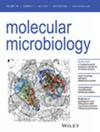Pxp复合物解毒5-氧脯氨酸并促进艰难梭菌的生长
IF 2.6
2区 生物学
Q3 BIOCHEMISTRY & MOLECULAR BIOLOGY
引用次数: 0
摘要
艰难梭菌是一种以休眠孢子形式在环境中传播的厌氧肠道病原体。对于艰难梭菌和其他产孢细菌来说,产孢的起始是一个受调控的过程,在有利的生长条件下阻止孢子的形成。在枯草芽孢杆菌中,阻止产孢的机制之一是原核5-氧脯氨酸酶PxpB (KipI),它阻碍了主要产孢激酶的激活。此外,PxpB作为一个复合物的一部分,可以解毒中间代谢物5-氧脯氨酸(OP),这是谷氨酸及其衍生物的有害副产物。在这项研究中,我们研究了艰难梭菌中的同源Pxp蛋白,以确定它们在调控孢子形成和代谢中的作用。通过删除pxpAGBC操纵子,我们发现,与枯草芽孢杆菌不同,Pxp (Kip)蛋白对孢子形成没有显著影响。然而,我们发现pxp操纵子编码一种功能性的氧脯氨酸酶,促进OP的解毒。此外,我们的数据表明,PxpAGBC不仅可以解毒OP,还可以使OP作为支持艰难梭菌生长的营养来源,从而促进代谢的有毒副产物转化为能量来源。本文章由计算机程序翻译,如有差异,请以英文原文为准。

The Pxp Complex Detoxifies 5-Oxoproline and Promotes the Growth of Clostridioides difficile
Clostridioides difficile is an anaerobic enteric pathogen that disseminates in the environment as a dormant spore. For C. difficile and other sporulating bacteria, the initiation of sporulation is a regulated process that prevents spore formation under favorable growth conditions. In Bacillus subtilis, one such mechanism for preventing sporulation is the prokaryotic 5-oxoprolinase, PxpB (KipI), which impedes the activation of the main sporulation kinase. In addition, PxpB functions as part of a complex that detoxifies the intermediate metabolite, 5-oxoproline (OP), a harmful by-product of glutamic acid and its derivatives. In this study, we investigate the orthologous Pxp proteins in C. difficile to determine their roles in the regulation of sporulation and metabolism. Through deletion of the pxpAGBC operon, we show that, unlike in B. subtilis, the Pxp (Kip) proteins have no significant impact on sporulation. However, we found that the pxp operon encodes a functional oxoprolinase that facilitates detoxification of OP. Furthermore, our data demonstrate that PxpAGBC not only detoxifies OP but also allows OP to be used as a nutrient source that supports the growth of C. difficile, thereby facilitating the conversion of a toxic by-product of metabolism into an energy source.
求助全文
通过发布文献求助,成功后即可免费获取论文全文。
去求助
来源期刊

Molecular Microbiology
生物-生化与分子生物学
CiteScore
7.20
自引率
5.60%
发文量
132
审稿时长
1.7 months
期刊介绍:
Molecular Microbiology, the leading primary journal in the microbial sciences, publishes molecular studies of Bacteria, Archaea, eukaryotic microorganisms, and their viruses.
Research papers should lead to a deeper understanding of the molecular principles underlying basic physiological processes or mechanisms. Appropriate topics include gene expression and regulation, pathogenicity and virulence, physiology and metabolism, synthesis of macromolecules (proteins, nucleic acids, lipids, polysaccharides, etc), cell biology and subcellular organization, membrane biogenesis and function, traffic and transport, cell-cell communication and signalling pathways, evolution and gene transfer. Articles focused on host responses (cellular or immunological) to pathogens or on microbial ecology should be directed to our sister journals Cellular Microbiology and Environmental Microbiology, respectively.
 求助内容:
求助内容: 应助结果提醒方式:
应助结果提醒方式:


